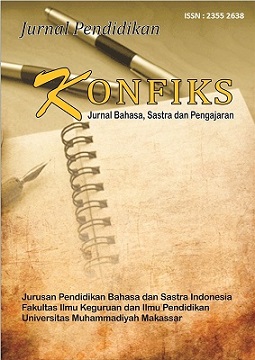ANALYSIS OF ANGRY EXPLOSIONS IN DELI MALAY: A STUDY OF NATURAL SEMANTIC METALANGUAGE
DOI: https://doi.org/10.26618/konfiks.v12i1.13687
angry swear words, Deli Malay, natural semantic metalanguage
Abstract
This study aims to describe and analyze the meaning of swear words in Deli Malay through the theory of Natural Semantic Metalanguage (MSA). The focus of the study is directed at the forms of metaphors and allusions that represent the expression of anger of the Deli Malay community in the city of Medan and its surroundings. The data studied are in the form of oral speech obtained from native speakers aged over 40 years who use BM Deli in everyday life. The data collection technique was carried out using the listening method, with advanced techniques in the form of listening with conversation and listening without conversation. Data analysis was carried out using the MSA-based semantic element and explication separation technique to reveal the original meaning of each form of swearing. The results of the study show that angry swearing in Deli Malay does not only function as an emotional release, but also as a reflection of the local cultural value and cognition system. The swearing systematically utilizes linguistic references such as body parts, kinship terms, animals, professions and social activities, which have the meaning of “bad”, “doing”, “feeling”, “knowing”, and “happening” in the original meaning structure. The MSA theory makes an important contribution in identifying universal meaning elements and at the same time explaining cultural specificities in the linguistic expressions of the Deli Malay community. Thus, this study strengthens the position of MSA as an effective theory in explaining the relationship between language, emotion, and culture from a cross-linguistic semantic perspective.
References
Ayu, S., Eny, P., & Bali, BB (2018). The Verb “Cooking” in Balinese: A Study of Natural Semantic Metalanguage (MSA) . 30 (1), 121–132.
Daulay, S. (2020). Proverbs and Expressions in the Batak Angkola Language (Natural Semantic Metalanguage Study). Jurnal Edukasi Kultura: Journal of Language, Literature and Culture , Vol 7, No 1.
Foley, W. A. (1997). Anthropological Linguistics: An Introduction. . Oxford: Blackwell Publishers.
Goddard, C. (1996). Building a Universal Semantic Metalanguage: The Semantic Theory of Anna Wierzbicka. Goddard (Convenor). Cross Linguistic Syntax from Semantic Point of View (NSM Approach). Australia : The Australian National University.
Indrawati, D. (2006). Swearing in Madurese: A Study of Natural Semantic Metalanguage. Indonesian Linguistics , 24th year, No. 2.
Laudra, DC, Pauziah, F., Siburian, NU, Siburian, G., Manalu, SB, & Ivanna, J. (2021). Getting to Know and Preserving Deli Malay Culture in Medan City, North Sumatra. Jotika Journal in Education , 6-9.
Lubna, S. (2016:61). Expression of Anger in the Melatu Language of Pontianak, West Kalimantan. Tuah Talino Journal , 16. vol 08.ISSN: 0216-079X.
Miles, MH (2014). Qualitative Data Analysis, A Methods Sourcebook, Edition 3. USA: Sage Publications. Translated by Tjetjep Rohindi Rohidi, . UI-Press.
Montagu, A. (1973). The Anatomy of Swearing. New York: CollierMacmillan Publishers.
Mulyadi. (2012). Emotional Verbs in Indonesian and Asahan Malay: A Cross-Language Semantic Study. Dissertation of Linguistics Study Program, Udayana University.
Novita, A., Fadillah, R., Rochim, JF, & Darrienda, AA (2024). Contrastive Analysis of Words Expressing Angry Emotions in Japanese and Indonesian (Viewed from a Syntax Perspective) . 4 (1), 185–192.
Parwati, SA (2018). Cooking Verbs in Balinese: A Natural Semantic Metalanguage Study. Aksara , V30il.73. 121-13231.
Sudaryanto. (1993). Methods and Various Techniques of Language Analysis. Yogyakarta: Duta Wacana University Press.
Sutjiati, BN (2003). "The Role of Semantics in Translation". Introductory Speech of Permanent Professor of Udayana University, Denpasar.
Talino, T., Bahasa, B., & Barat, K. (2016). Expression of Anger in Pontianak Malay, West Kalimantan Syarifah Lubna . 8 (September), 60–68.
Wierzbicka, A. (1996). Semantics: Primes And Universals. Oxford: Oxford University Press.
Wijana, ID, & Rahmadi, M. (2013:3). Sociolinguistics: A Study of Theory and Analysis. Yogyakarta: Pustaka Pelajar.
Downloads
Additional Files
Published
Issue
Section
License
Authors who publish with this journal agree to the following terms:
The author owns the copyright and grants the journal rights for first publication with the work simultaneously licensed under a Creative Commons Attribution License which allows others to share the work with acknowledgment of the work's authorship and initial publication in this journal.
Authors may enter into separate additional contractual agreements for the non-exclusive distribution of the published journal version of the work (for example, posting it to an institutional repository or publishing it in a book), with acknowledgment of its initial publication in this journal.
Authors are permitted and encouraged to post their work online (for example, in institutional repositories or on their websites) before and during the submission process, as this can lead to productive exchanges, as well as earlier and larger citations of published work (See The Effect of Open Access).
Statement of Authenticity and Manuscript Copyright can be downloaded: Here
After filling in the statement letter, please send via e-mail: konfiks@unismuh.ac.id





.png)


